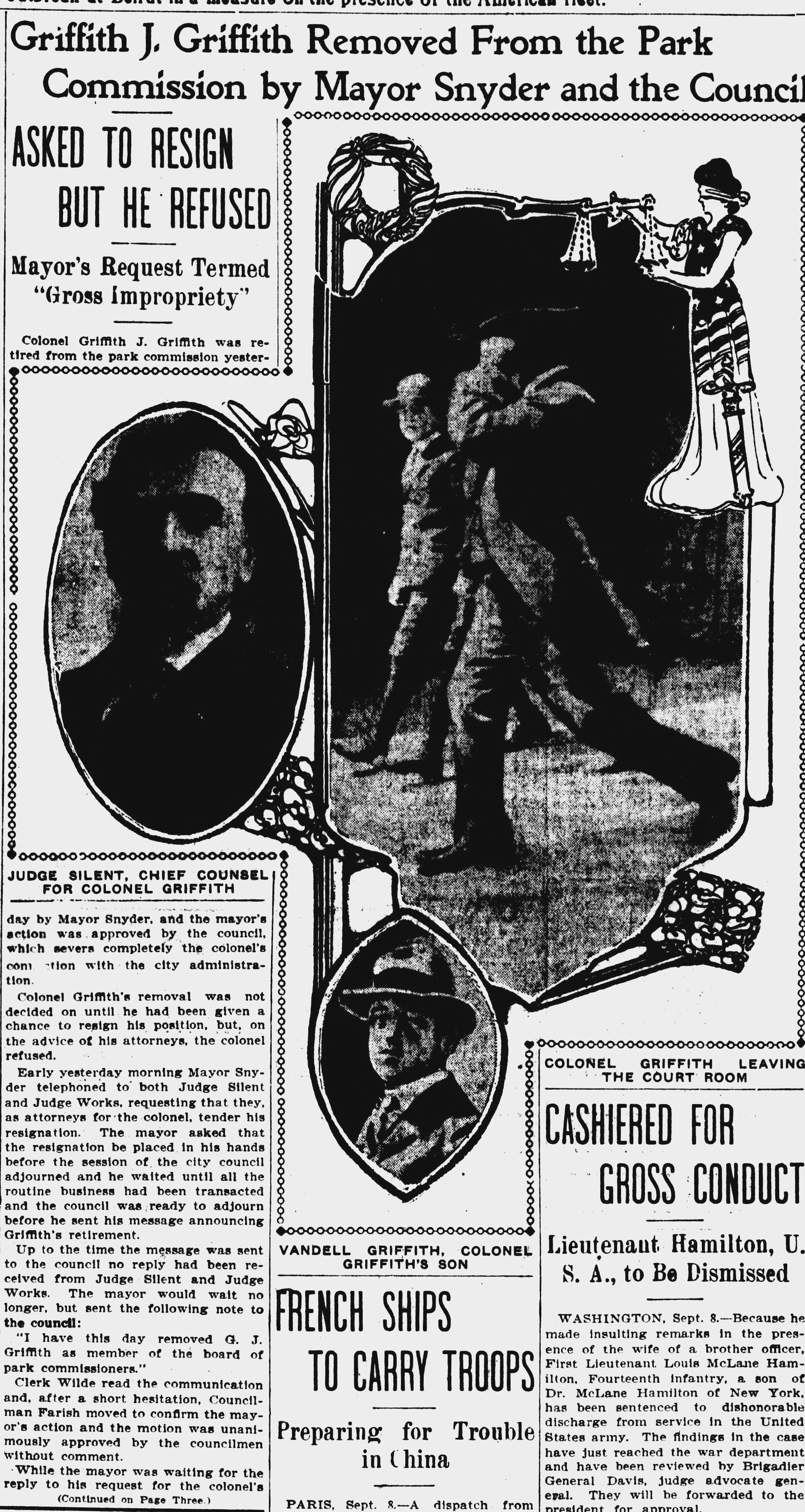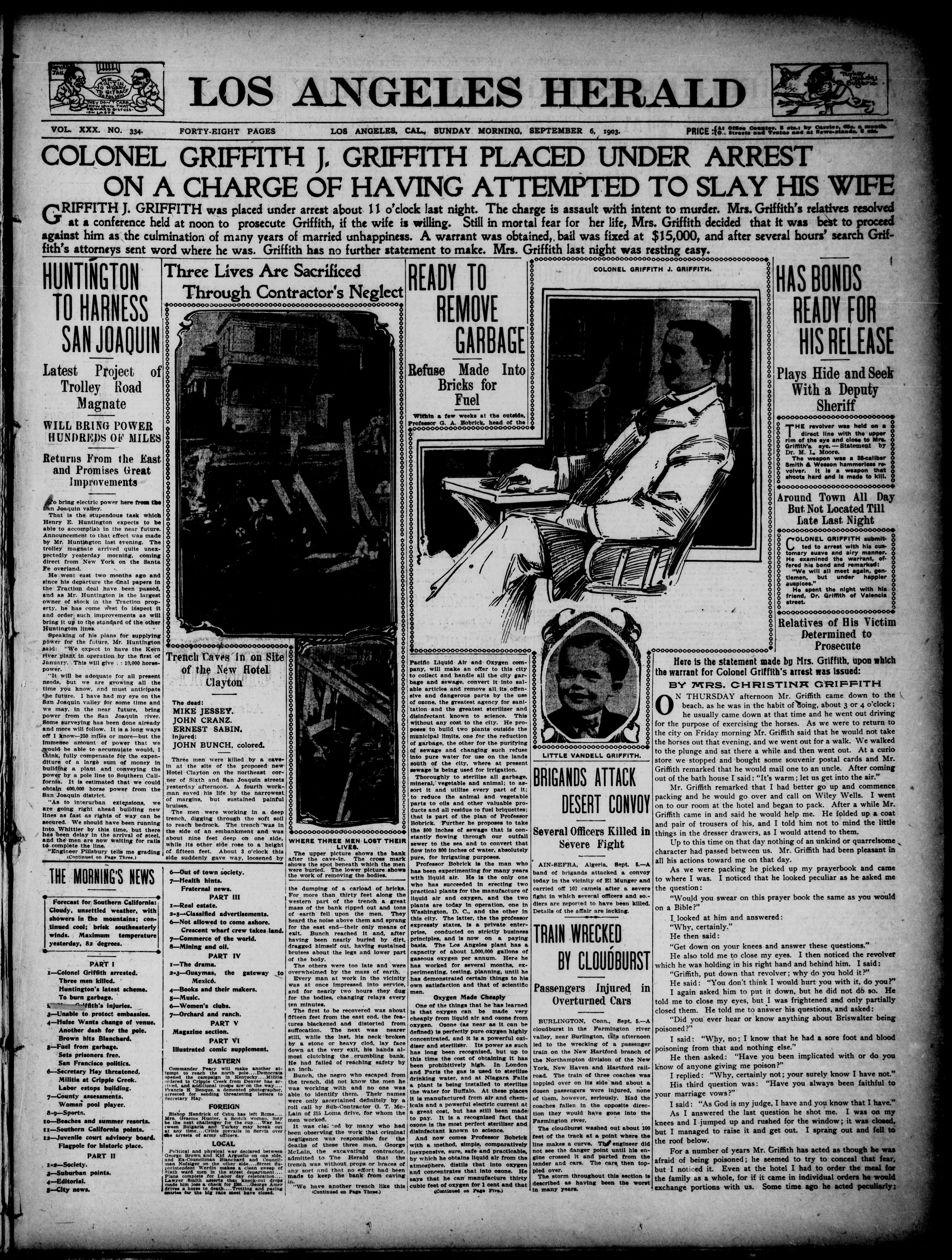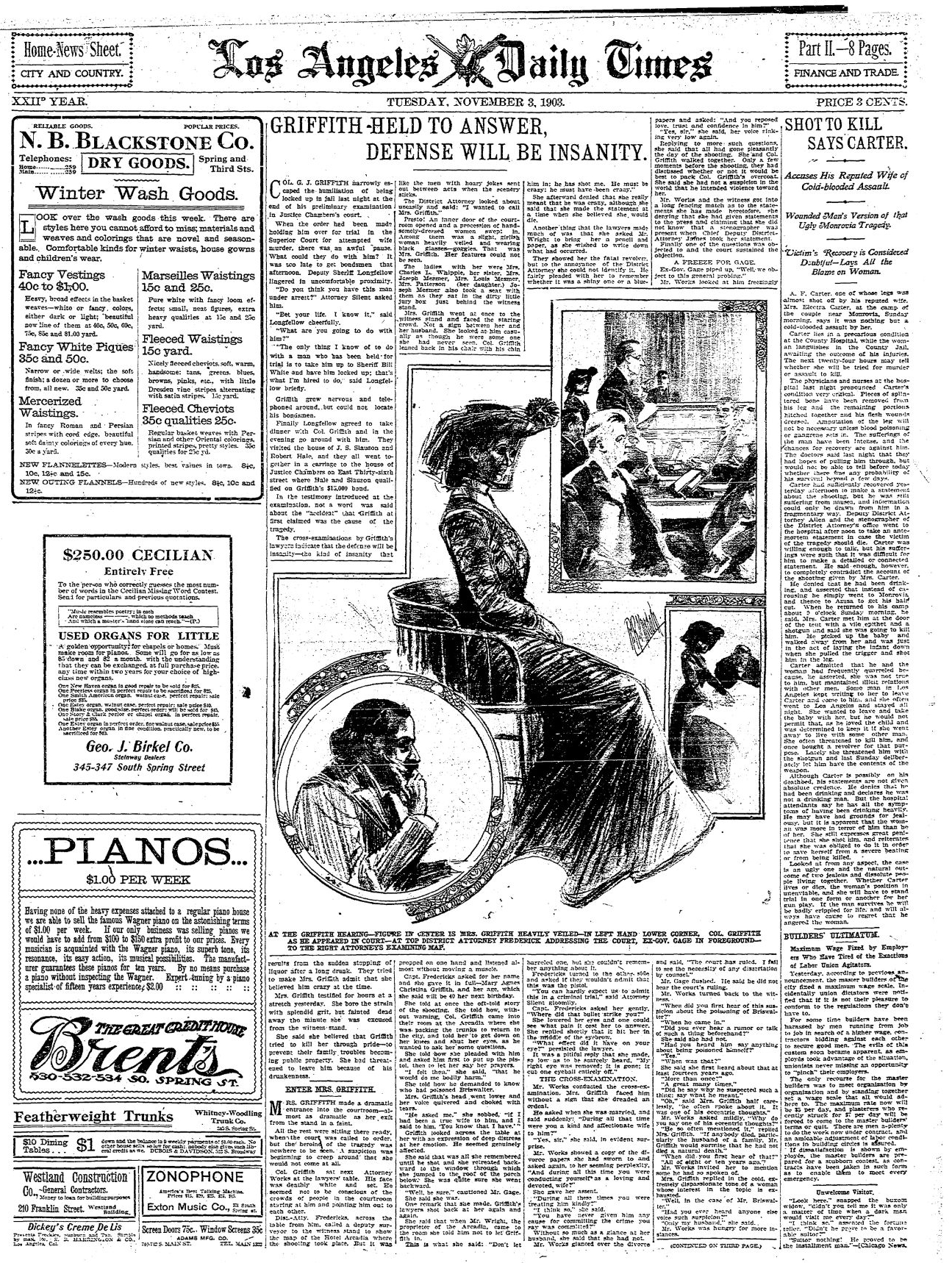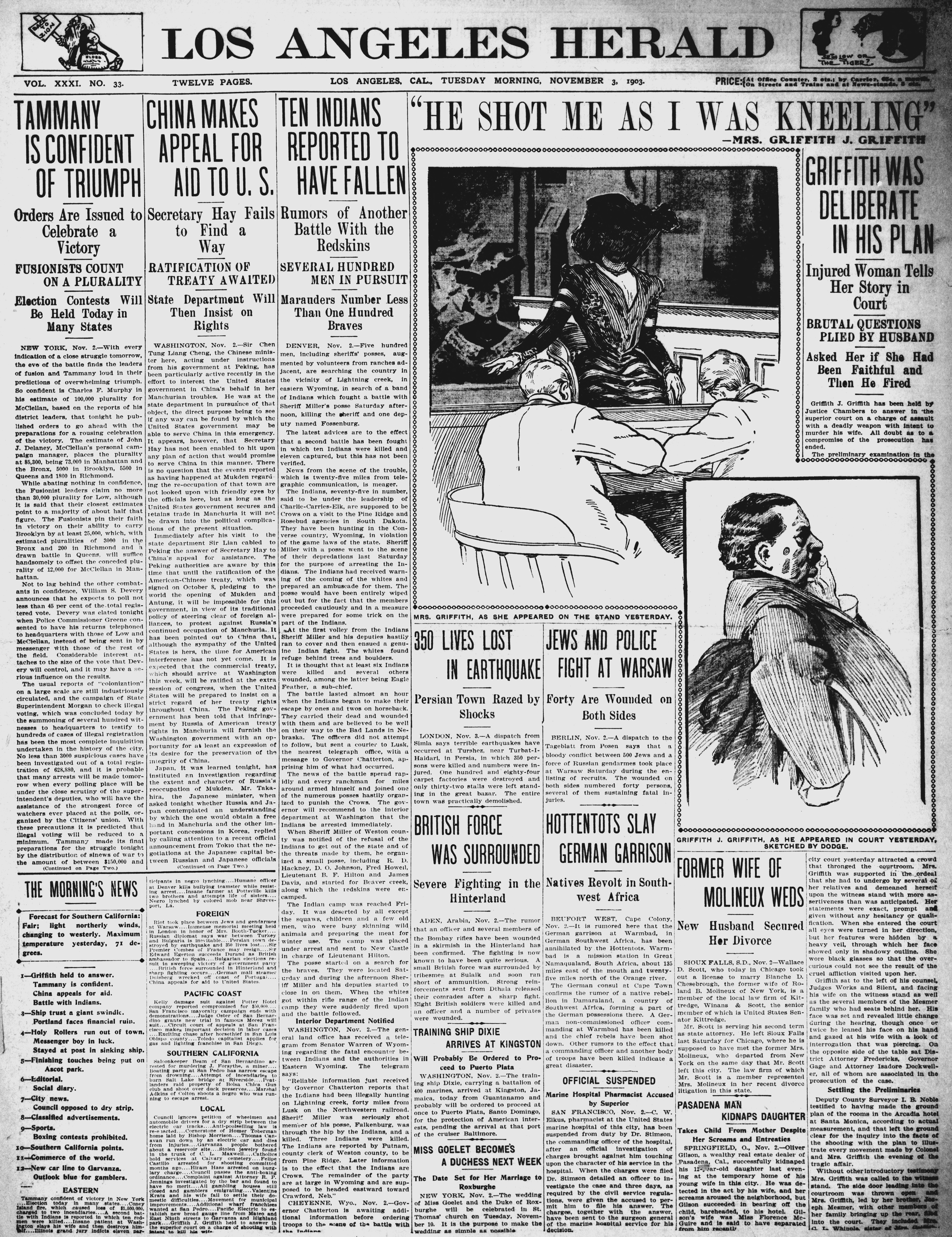11 Pre-Trial Reality Check
SEPTEMBER 4 to NOVEMBER 3, 1903
“His jaunty affectations, his airy deportment, his apparent unconcern, all denote an utter absence of feeling, a lack of appreciation of the enormity of the offense with which he is charged by the woman he once swore to cherish and support.”
— Los Angeles Express editorial on September 9, 1903, describing Grif
Will he or won’t he stand trial? That was the question being asked, and even wagered on, among Angelenos for eight weeks after the shooting.
Tina did not immediately file charges against Grif because her family initially debated if doing so would tarnish the Mesmer name and scar her young son, Van.[1] That hesitation meant Grif walked the streets a free man for nearly two days — a fact that much of the public, and press, found hard to believe. It also reinforced Grif’s behavior of a man convinced he would never face trial.
For those two surreal days, Grif acted as if nothing had happened, or at least changed, in his life. Yes, he did join the entourage that took Tina by train to a Los Angeles hospital the morning after the shooting. But then he was off to City Hall, where the council a day earlier had approved Griffith’s bond to secure construction of Eddy’s incline railway up to Griffith Peak. From City Hall he visited the Jonathan Club, reportedly for lunch and alcohol, before returning to the Hotel Arcadia, staying there the next two nights. Grif apparently had no qualms about sleeping at the scene of the tragedy, and even had Van with him.[2]
It was probably Grif’s comments to the Herald about Tina and her religious fervor, along with his cavalier attitude, his attempt to keep Van by his side and, last but not least, Tina’s fear that he might one day succeed in killing her, that finally led Tina to file charges at 4 p.m. on Saturday, September 5. A Mesmer family spokesman said he personally was “ashamed that the matter hung so long in the balance,”[3] but at least the arrest order was issued within two hours and the charge was clear: assault with intent to commit murder. As per local law, the order came with clarification that immediate arrest could be waived with a $15,000 bail bond.
When a deputy sheriff, followed by two reporters, finally tracked Grif down at 11 p.m. that evening at the home of a friend, Grif was relaxed, even amiable, and handed over the bond that his lawyers had dutifully anticipated.
Grif “showed the greatest composure and extreme cordiality,” the Times reporter wrote, chatting “in a cheerful manner about the fig trees in the backyard, the days when he was a newspaper reporter, and the pleasantness of meeting newspaper men at any time.”
A Herald reporter was present as well, noting that “The colonel passed the matter off with his customary lightness” and bade farewell with “We will all meet again, gentlemen, but under happier auspices.”
The Herald did emphasize the arrest, however, running a two-deck, front-page headline:
COLONEL GRIFFITH J. GRIFFITH PLACED UNDER ARREST
ON A CHARGE OF HAVING ATTEMPTED TO SLAY HIS WIFE
And the fact that the sheriff had had a hard time finding Grif made for a clever secondary headline: “Plays Hide & Seek With a Deputy Sheriff”.
But neither paper initially complained that Grif remained free on bail and on September 7 the Times even tried to paint a more compassionate portrait. “Col. Griffith is suffering from extreme nervousness,” the doctor at whose home Grif was staying told the Times, “and has reached that point where the reaction from the nervous strain is setting in.”
The Times then quoted an unnamed friend who visited Grif the previous day. “No man was ever placed in a more terrible position, and I feel for you,” the friend reportedly told Grif. That sympathy, the Times stated, “proved too much” for Grif, “and this strong man, who was never before known to lose his composure, broke down. His face twitched as he tried to answer, and the cords in the back of his neck moved up and down, the veins in his forehead swelled, and his eyes filled with tears. He cried like a child.”
The Express reported that on September 8 Grif had started “the Keeley cure” — a popular treatment across the country for excessive drinking and/or drug consumption that required four injections per day of a secret formula. That didn’t prevent Grif from visiting local saloons Tuesday night, the Express added, since the “treatment” allowed patients to continue their “convivial habits” for a few days into the therapy. [4]
Stoic or Stupid?
Grif seemed to be holding up well, even on September 8, the day of his arraignment on the attempted murder charge. That same day Tina filed for custody of Van, filed for a financial/property settlement and, last but not least, filed for divorce — which was unexpected given her devout Catholicism. And to add insult to injury, Mayor Snyder had set an afternoon deadline for Grif to tender his resignation from the Park Commission.
Surely, his stoic façade would crack. But that Tuesday started with Grif as affable as ever — and ended with his customary drinks.
“He looked like a gentleman out for a morning stroll instead of a man on his way to answer to a charge of assault to murder upon his wife,” was how the Herald described Grif’s court arrival that morning.
The Express noted that Grif “was carefully groomed and smiling as usual” and was even accompanied by Van and a friend of the boy’s. “If Colonel Griffith has been on the verge of nervous prostration he apparently had fully recovered when he appeared in court this morning,” the Express added. Over recent days, he’s been “attending to his affairs as usual, going to his office at his usual hours, and otherwise passing the time as if there was nothing out of the way in his routine.”
The arraignment, which was not to enter a plea but to assure the court that a defendant had legal representation, was brief. Father, son and son’s friend then went to Tina’s hospital where Grif waited in his buggy while Van visited his mother. Tina’s family had already made clear that she “is in terror lest her husband force an entrance into the hospital.”[5] So it must have been awkward, to say the least, when Tina’s doctor walked past Grif outside and felt obligated to say a few words to the accused.
This was happening while divorce papers were being prepared, and while Snyder, who just four months earlier in Hollywood had only words of praise, was now booting Grif off the Board of Park Commissioners. “Griffith Dropped” was the unceremonious Times headline. The City Council quickly and unanimously approved the request by Snyder, whose argument, the Times summarized, was that Grif was “insane and incapacitated for holding public office.” His dismissal “will undoubtedly wound Col. Griffith to the quick, as he was especially proud of his official position,” the Times noted.
Grif kept his cool in public, reportedly visiting a few saloons the night of Snyder’s attack, and using his lawyers as his shields and weapons. His legal team accused Snyder of “gross official impropriety” and said Grif would never resign since the demand was “an attempt in this hasty and semi-official way, to prejudge Col. Griffith’s case before there has been even a preliminary hearing.”[6]
But Grif’s demeanor didn’t win over many fans, and the Express used its bullhorn to say it had had enough. Griffith’s behavior should “disgust all self-respecting citizens,” it said in an editorial on September 9. “His jaunty affectations, his airy deportment, his apparent unconcern, all denote an utter absence of feeling, a lack of appreciation of the enormity of the offense with which he is charged by the woman he once swore to cherish and support.”
The Express gloated that “public sentiment will heartily approve the action of Mayor Snyder” and noted that since Griffith Park had become “handicapped so signally by its name” the City Council should find a way to rename it. “This city cannot afford to own a park whose title exploits a name which just now is in deserved ill-odor,” it editorialized again on September 10.
Grif never publicly defended himself against these attacks, and still had the Times‘ sympathy. “No Conviction Before Trial” was its editorial headline on September 11, perhaps a reflection that it was hard to believe someone from the elite could behave so badly. Snyder’s action was “hasty”, the Times wrote, adding that the Express was guilty of “indecency” for waging “a campaign of argument and vituperation in order to prejudge the case”.
The pro-labor Los Angeles Record joined the editorial melee, stating the same day in a piece titled “It Matters Whose Ox is Gored” that had Grif been a union activist the Times — which led the local anti-union campaign — “would furiously denounce the man and furiously denounce the unions. But the man in the case happens to be a millionaire, a colonel and a friend of the Times.”
The Real Deal of Divorce
While Grif appeared to weather those early days, the blows were real. By September 9 a trial seemed likelier, he had been stripped of the park commissioner title he so cherished, and Tina obliterated a pillar of Grif’s American Dream: the image of a happy marriage. That afternoon, the Express had this front-page development:
APPLIES FOR DIVORCE
“Grievous bodily injury and grievous mental suffering” were alleged, and Tina claimed Grif had acted violently before. She didn’t provide specifics, just that “during the four years last past” he had treated her “in a cruel and inhuman manner”. The specifics would come a month later, and just a few days after that Tina secured a bigger settlement than what Grif had initially offered — perhaps she had vowed to reveal even more if he didn’t agree to terms?
What Tina could not expect was a separate lawsuit seeking personal injury damages. That’s because under local law at the time, spouses were not allowed to press domestic violence charges against one another. (And that didn’t change until 1962, when the California Supreme Court finally overturned the law.)
So what exactly did Tina want? The divorce, yes, but also custody of Van, money to pay her legal bills, her medical bills and her daily expenses, followed by alimony or some long-term financial settlement. More complicated was her wish to settle their Briswalter property dispute once and for all. Her own divorce lawyer was not optimistic that she would see much from the Briswalter inheritance since she willingly deeded it over to Grif on the eve of their marriage. “It was an act of renunciation based on the old idea of a dower,” her lawyer told the Herald, “and it will be exceedingly difficult to attack the property now.”[7]
Tina did make the smart move of suing not just Grif, who had little cash in his personal accounts, but also the two companies where he had stashed his wealth: Briswalter Land & Water, and Pacific Art Tile. The former had properties soon to be on the market, and the latter was using investors’ capital to build the biggest tile factory west of the Mississippi.
Van Sides with Dad
A judge on September 9 blocked those companies from any asset transfers pending the divorce case and placed Van in his mother’s custody temporarily — the first of several moves that turned the Griffiths’ son into a legal chess piece.
At first, the 15-year-old didn’t seem to grasp what was happening. A reporter two days after the shooting asked Van who he would rather live with if he had to choose. “Why I never thought of that,” he said in surprise. “I don’t know which, but I hope they don’t separate.”[8]
Those first few days he did stay by his father’s side — at least when Grif wasn’t with his lawyers, at Keeley, the Jonathan Club, or saloons. The judge’s order was even defied for nearly a week as it looked like Van himself would put up a fight if forced to live with Tina’s family until she was discharged from hospital.[9] The impasse continued three more days, when finally he moved in with Tina’s stepmother.
Van must have admired Grif immensely, seeing only the dashing dad always in demand for community events and business deals. And Van himself would spend much of his adult life protecting and enhancing Griffith Park — first as a city transport commissioner, where he could ensure an affordable bus service into the park, then as the city’s park developer and later as a park commissioner himself.
In court, Tina’s lawyer made no bones about why the judge should give her full custody of Van. “He is a murderer, death only lacking,” Henry Gage, a former California governor, said of Grif. “Shall the court turn over this child that he may have another victim?”[10]
It was hard to argue with that and, with Tina now out of hospital, the judge ruled she should indeed have full custody pending Grif’s trial.
Cash Clash
The biggest divorce knot was over money. Pacific Art Tile didn’t have assets that could easily be turned into cash, but Briswalter had lots of land yet to be sold off. Grif’s lawyers even noted that the judge’s action had blocked Briswalter from subdividing $300,000 worth of lots at the southern end of Rancho Los Feliz.[11]
Three weeks into the divorce case, Grif offered Tina $35,000 cash as a property settlement. The Times on September 29 headlined it “Cash Balm for Wounds”. But Tina’s brother Joseph told the press that the offer was insufficient, and an unnamed friend of Tina’s was put forth in the Times to explain how Tina was only seeking a “just share” of the Briswalter fortune.
The next month involved lawyers fighting over Van’s status, just how much Grif was worth and how much Tina needed to live a comfortable life. In his legal response to the divorce filing, Grif denied shooting or abusing Tina and stated that, while they had no community property, if she really wanted the divorce their total family expenses had been around $200 a month so she and Van could make do with $100-$125 a month.[12]
Neither side had much traction until October 13, when Tina used the card she had hinted about in the earlier divorce papers: Griffith J. Griffith had abused her in recent years, she said in an amended complaint that detailed those allegations. The press had new drama to feed their readers. “Another chapter has been added to the sensational Griffith case,” the Herald announced.
The Times was now starting to join the media circus with its own choice, colorful words splashed in big type: “Mrs. Griffith Smites Again” was the Times headline. “She was egged on to file this amended complaint by Col. Griffith’s sworn answer, in which he made the assertion that he had always been ‘a kind and loving husband’,” the report stated. “She swears that in yesterday’s amended answer that he manifested his loving consideration by trying to murder her with a loaded revolver three months before the Santa Monica tragedy, also by making a brutal assault upon her (in 1900) and cheating her out of her property.”
The alleged 1900 incident had actually been disclosed a month earlier by Isidore Dockweiler, one of Tina’s lawyers, who elaborated that Grif tried to throw her out a Hotel Nadeau window but that she refused to seek a divorce then for fear of losing custody of their son.[13]
In the amended divorce filing, Tina stated that another incident in May 1903 could have been fatal had it not been for “the sudden arrival of their son” as that allowed her to “escape from the room and fly from the house.”
As for property, Tina explained her share of the Briswalter tract was worth $200,000 when she deeded it over to Grif. That amount, plus interest and any profits made with that money, should go to her, she argued.
By now, how this would play out was anyone’s guess — and some had made it a betting game. “Oh, no, there’s nothing of that kind,” Dockweiler said when asked by a reporter early on if it was true Tina would not press charges. “I have heard that they are making bets that she will not attempt to send him to State’s prison,” he added, “but I don’t think there is any intention of dropping the prosecution.”[14]
A settlement was finally hammered out on October 24: $62,500 to Tina for the property and alimony claims (about $230,000 today), plus Tina kept custody of Van, who could finish his Catholic high school education and would then go to Stanford University at Grif’s expense. “Col. Griffith Makes Handsome Provision for His Wife” is how the Times headlined the news. Yes, it reads quite misogynistic — Grif portrayed as generous, even if he’s accused of trying to kill his wife, who, by the way, wants a divorce.
Given the out-of-court financial deal, it seemed like the scandal was over. The criminal case “is not likely to go much further,” the Times wrote. “It is not probable now that Col. Griffith ever will be convicted.”
But what Grif most desired was specifically left out of the settlement. The Herald noted that “remaining to be adjusted” was the attempted murder charge. The Express voiced the thoughts of many when it demanded a trial. “All attempts to settle the case out of court are hopeless,” it argued in an editorial. “No man or woman, rich or poor, can transgress the laws of the state with impunity. At least the form of a trial must be observed and a verdict rendered in accordance with the evidence.”
If anyone still doubted whether the trial would go on, Tina made it very clear on October 27 what her intentions were. Her left arm in a sling, her face heavily veiled and fitted with a glass eye on her right side, she left the hospital that day for the first time since she had been admitted seven weeks earlier. She was not off to visit family or friends, but to recreate what happened at the Hotel Arcadia, joined by her sister, Dockweiler, Gage and District Attorney John Fredericks, who was to be the lead prosecutor.
To those who doubted there would ever be a trial, Fredericks had a response. “I know it is a popular belief that it is as difficult to prosecute a rich man for a crime as it is for a camel to go through the eye of a needle,” he told the Express on October 24, “but I do not see any difference between the Griffith case and any other case so far as my office is concerned.”
Insanity Strategy Unveiled
On November 2, just five days after Tina’s hotel visit, Grif was back in court. This was not the trial but a preliminary hearing, where a judge hears testimony in order to decide whether there is enough evidence for a trial.
Of that there was little doubt since Tina was ready to testify. Dressed in a “handsome costume of red silk trimmed with black lace and velvet trimmings,” the Herald noted, “all eyes were turned in her direction” when she entered the court. “Her features were hidden by a heavy veil, through which her face showed only in shadowy outline. She wore black glasses so that the overly curious could not see the result of the cruel affliction visited upon her.”
Asked by her lawyer to recount the shooting, her description remained as before, with two exceptions. First, she recalled that she had asked, and was allowed, to pray on Grif’s order to kneel.
Secondly, she modified what she had told the Arcadia owner when, with Grif in tow, he first entered the room she had fled to after the shooting. She initially told her sister her cries were: “Don’t let him in! He has shot me! He must have been crazy!” But now she omitted the last five words, and Grif’s team, on cross-examination, pounced on that.
Tina insisted she had said that earlier only “in a casual way. In my own mind I did not think” he really was insane. Grif’s team then began a line of questioning that would make Grif look crazy even if Tina would not say so.[15] The questions and Tina’s responses:
Did Mr. Griffith fear being poisoned? Yes, it was such that he would take precautions when dining at the hotel where they lived, she replied. “If soup was brought in individual dishes, he would exchange plates with me. I always took it. I humored him this way constantly.”
Did Mr. Griffith ever accuse you of poisoning him? “He said if he thought I had he would do me bodily harm.”
Did he accuse you of being unfaithful? “Several times, principally when he was under the influence of liquor.”
Had he been drinking before the shooting? Heavily about 10 days prior, and about three days prior “I told him that if he did not cease drinking so much I should go home.” He appeared to stay sober after that.
How much did Mr. Griffith typically drink? “Well, he never left the house without taking a drink, and he never came into the house without taking one, and, of course, I don’t know how many he took in between.”
The defense team’s strategy, should there be a jury trial: blame the shooting on temporary insanity due to heavy drinking and hope to get Grif off with a stay at an asylum, not prison.
That questioning, followed by a snicker running through the courtroom, ended the cross-examination. As Tina got up to leave, she wobbled and nearly fell over. Her brother Joseph helped her walk to the judge’s chambers a few feet away where, “just as the door swung to open, she lurched forward and swooned dead away into the arms of one of the women” in her entourage.[16]
After a lunch recess, Tina was questioned by District Attorney Fredericks.
Why would Col. Griffith shoot you? “I had threatened to leave, and I think he realized I would not stand it much longer. It had certainly come to the question. He is very proud, and did not want the public to know. Of course, I would have had to, well, there would have been charges of cruelty and so on. Then we would have had to divide the property, and he didn’t want the public to know about it.”
Asked if she had demanded a property settlement, Tina said she had often asked Grif for an accounting of the Briswalter inheritance but he always put it off.
Avoid Prison at any Cost
After testimony from three more witnesses — Tina’s sister, her doctor and the Arcadia owner — the judge ruled on November 3 that the evidence was sufficient, Grif indeed would have to stand trial. The charge: assault with a deadly weapon with intent to murder.
So there it was. In just a few hours, and solely because of Grif’s lawyers, a decade’s worth of work building a reputation of enlightened do-gooder had been undermined. Grif’s tattered persona would be further torn apart five months later, and during two weeks of trial. Partly by newspapers, partly by public gossip, but mostly by his own lawyers and with his grudging consent. It’s hard to believe that Grif would accept a temporary insanity strategy given how big his ego was, but it also shows how desperate he had become nearly two months after the shooting. His priority was always to avoid prison — and now he and his lawyers felt the only way to do so was to destroy the Griffith name by calling witnesses who would vouch for his insanity.
That wasn’t Grif’s first choice, obviously. Remember, he first talked about the shooting as being an accident, and then planted the seed of attempted suicide and religious fanaticism. That was during the first two days after the shooting, days that were surreal given Grif’s dismissive attitude, Tina’s delay in pressing charges, and Tina’s family leaking details about their marriage.
Now, however, it was clear to all that a trial was inevitable. Each side had hired the best lawyers in Los Angeles. Tina’s team was led by DA Fredericks, former Gov. Gage and Dockweiler. Grif dismissed his pre-trial lawyers and hired the city’s best criminal lawyer, Earl Rogers. Ironically, Rogers was first reported as having been hired by Tina, a news account Rogers quickly denied.[17] That was followed by reports he had joined Grif’s team, which he also denied — at first. As his daughter later reflected, Rogers was ever so reluctant to defend someone with so little public support, but he went all in when he saw the opportunity to use a still novel defense: alcoholism is a disease that had made Grif temporarily insane.
What’s ironic about all the legal strategizing is that Tina’s family at first accepted the idea of an insane Grif. “If he wishes to plead insanity,” Dockweiler, acting as a family spokesman, told reporters just three days after the shooting, “I am willing and hope that he will be placed in some private asylum.”[18]
But at some point, perhaps due to Grif’s continued denial in his October 10 response to Tina’s divorce filing, the prosecution went after attempted murder, which at the time would have meant 14 years at San Quentin if convicted.
The lawyers on each side now knew who they would face, and what the basic strategies would be. The next few weeks would focus on finding witnesses and medical experts to support each side. Tina’s lawyers would try to show Grif was very much sane and after her wealth. Grif’s lawyers would round up bartenders, Jonathan Club members, doctors and even a barber to try to prove he was temporarily insane.
The pro-labor Record had predicted a mighty battle and now both sides began arming themselves. “All Los Angeles is promised the most sensational court trial which it has ever seen,” the paper had editorialized on September 7, “a public benefactor and a man of wealth and note on trial for a felony of viciousness.”
Of course, the press knew its public would devour coverage and, starting in December, Los Angeles had another newspaper, one whose publisher was famous for stories that appealed to the working man — and housewife. William Randolph Hearst’s Los Angeles Examiner would have not just a story, but a sensational trial to kick off its circulation war with the Herald, Times, Express and Record.
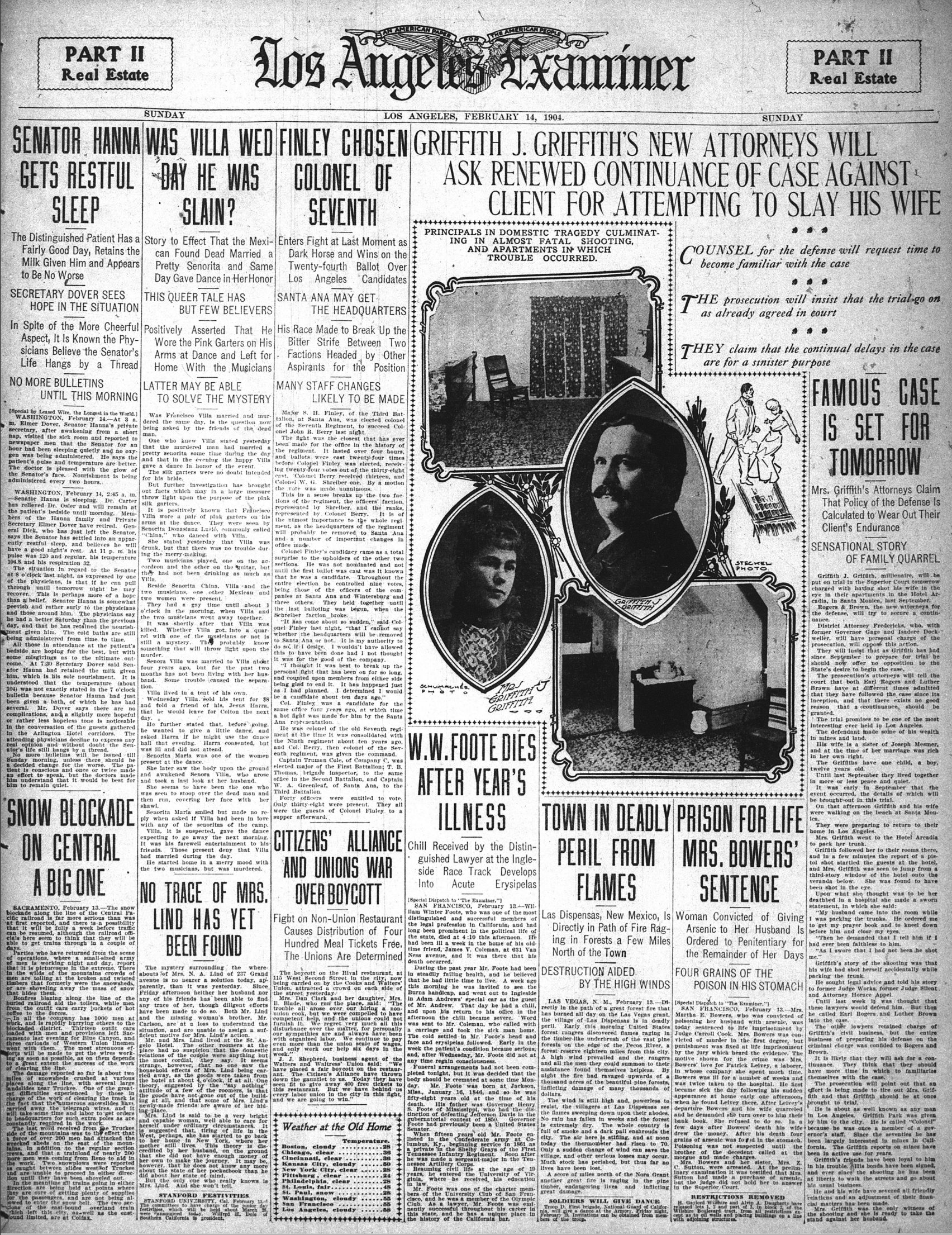
- Los Angeles Express, September 5, 1903. ↵
- Herald, September 6, 1903. ↵
- Times, September 6, 1903. ↵
- To its credit, the Keeley Institute was the first American medical institution to treat alcoholism as a disease, but its treatment methods were suspect. The secret formula, which had no scientific backing, was marketed as a way to detoxify nerve cells by using a gold compound. Later analyses suggested the formula, depending on where and when it was formulated, could contain up to 28% alcohol as well as ammonia, strychnine, morphine and/or opium. Like other unfounded patent medicines that were so popular in the 1800s, “the Keeley cure” began its decline after 1906 when the U.S. Congress passed the Pure Food and Drug Act to require that active ingredients be placed on medicinal labels. ↵
- Herald, September 5, 1903. ↵
- Herald, September 9, 1903. ↵
- Herald, September 11, 1903. ↵
- Herald, September 6, 1903. ↵
- Herald, September 13, 1903. ↵
- Herald, September 30, 1903. ↵
- Times, September 12, 1903. ↵
- Times, October 11, 1903. ↵
- Express, September 5, 1903. ↵
- Times, October 22, 1903. ↵
- Earl Rogers had not yet become Grif's trial lawyer, rather Grif used former judges Charles Silent and John Works for the pre-trial hearing. Both would later sue Grif for fees owed. ↵
- Times, November 3, 1903. ↵
- Times, September 7, 1903. ↵
- Herald, September 6, 1903. ↵
